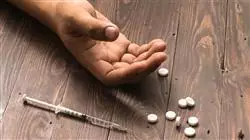University certificate
The world's largest faculty of medicine”
Description
Addictions are a public health problem and physicians are obliged to know how to intervene optimally. If you also want to learn about this field of work, then this professional master’s degree is for you"

In recent years, the UN has increased its estimate of deaths related to drug use worldwide to an estimated 585,000 in 2017, up from the 450,000 deaths it estimated occurred in 2015.
Among the most lethal drugs are opioids, which are behind two-thirds of recorded deaths. In the U.S. alone, overdose deaths in 2017 totaled 47,000. The UN estimates that some 42 million years of "healthy" life were lost due to premature deaths and years lived with some disability due to drug use.
In recent decades, those addictions where there is no substance that produces dependence, but rather a habit or behavior have also been added to list of addictions which require treatment. This is the case of pathological gambling and addiction to new technologies, which are causing serious psychological and social health problems in both adults and young people. For these cases, medicine has also developed treatments that seek to reduce and eliminate such habits and behaviors TECH will present them in the last unit of this program.
Aware of this reality, the teaching team of this professional master’s degree in Cognitive-Behavioral Treatment of Addictions has made a careful selection of each of the topics in this program. All this with the aim of offering the student an opportunity to study as complete as possible and always related to current events.
As it is an online Postgraduate Certificate, the student is not conditioned by fixed schedules or the need to move to another physical location, but can access the contents at any time of the day, balancing their work or personal life with their academic life.
Become a doctor capable of treating and curing patients with addiction disorders. This will help you to raise your profile"
This professional master’s degree in Cognitive-Behavioral Treatment of Addictions contains the most complete and up-to-date scientific program on the market. The most important features include:
- Development of clinical cases presented by professional experts
- The graphic, schematic, and practical contents with which they are created provide scientific and practical information on the disciplines that are essential for professional practice
- New diagnostic and therapeutic developments in the assessment, diagnosis and intervention of the biological and neurological processes that explain mental illness
- It contains practical exercises where the self-evaluation process can be carried out to improve learning
- An algorithm-based interactive learning system for decision-making in the clinical situations presented throughout the course
- With special emphasis on evidence-based medicine and research methodologies
- All of this will be complemented by theoretical lessons, questions to the expert, debate forums on controversial topics, and individual reflection assignments
- Content that is accessible from any fixed or portable device with an Internet connection
Smoking, drug addiction or alcoholism are just some of the addictions that will be studied in this professional master’s degree, paying special attention to the most effective treatment for these pathologies"
The program includes in its teaching staff, professionals belonging to the field of medicine, who bring to this program their work experience, as well as recognized specialists belonging to leading scientific societies of reference.
Thanks to its multimedia content developed with the latest educational technology, they will allow the professional a situated and contextual learning, that is to say, a simulated environment that will provide an immersive learning programmed to prepare in real situations.
This program is designed around Problem-Based Learning, whereby the professional must try to solve the different professional practice situations that arise during the course. For this purpose, the student will be assisted by an innovative interactive video system created by renowned and experienced experts.
The latest developments in the world of medical treatment of addictions compiled in an online program, 100% practical and eminently professionalizing"

Increase your confidence in decision-making by updating your knowledge through this professional master’s degree in Cognitive-Behavioral Treatment of Addictions and improve the care of your patients"
Objectives
In a world where substances harmful to health are within everyone's reach, having doctors trained to treat the addictions caused by them is crucial. Under this premise, TECH has designed this professional master’s degree, which aims to lay the foundations of medical knowledge so that the professional is able to address the treatment of smoking, drug addiction or alcoholism from a cognitive and behavioral perspective, taking advantage of advances in psychology in this aspect.

A unique and multidisciplinary program that puts the advances in addiction treatment at the service of physicians from an innovative perspective"
General Objectives
- Analyze the current state of the world of addictions and drugs
- Discover the neurological bases of different addictions
- Define the basic concepts commonly used by the scientific community in the field of addictions and formulate the different aspects to be taken into account by the expert in the assessment and intervention in these cases
- Provide a base of knowledge and procedures, which will give the student the necessary confidence and solvency to approach real cases
- Reflect and practice different situations of intervention in cases of addictions
- Establish the differentiating criteria between the prevention and treatment of addictions, as well as the levels of prevention which already exist
- Provide the student with the keys to the assessment framework in the case of addictions
- Show the criteria for the choice of therapeutic goals when facing an addiction intervention
- Describe in detail the basic protocol followed by the cognitive-behavioral approach in the treatment of addictions, its techniques, as well as therapeutic procedures from other approaches that may be complementary to the above approach
- Transmit the importance of multidisciplinary intervention as the key to the effectiveness of treatment in the case of addictions
Specific Objectives
Module 1. Current Classification of Addictions and Their Basic Concepts
- Analyze practical cases where you can observe the differences between good and bad praxis
- Provide information about the current state of the drugs market, well as the plans to fight against drugs and addictions
- Adequately measure the phenomenon of addictions and show the impact of these addictions on the population
- Describe the cognitive, affective and relational processes affected in cases of addictions
Module 2. Evaluation, Prevention and Psychological Treatment in Addictions
- Understand the effects of substances on the brain and the interrelation of the main neurological centers involved in addictions
- Highlight the techniques and tools of psychological assessment that the student will use in their daily practice, as well as the areas of assessment, in order to carry out a correct differential diagnosis as well as the detection of dual pathology
- Define the role of the psychologist in the assessment and intervention of addictions
- Identify the necessary criteria to carry out a preventative intervention as well as the most appropriate type of intervention in each case
Module 3. Cognitive-Behavioral Treatment of Smoking Addiction
- Propose therapeutic procedures and techniques from other areas which could help to improve the efficiency of the treatment, to prevent relapses and maintain the results
- Approach other pathologies present in tobacco addiction, as well as prevent relapses and maintenance protocols
Module 4. Time-Limited Psychotherapy Intervention in Smoking
- Define the historical and social aspects related to smoking
- Establish the prevalence of tobacco use in the world
- Understand tobacco prejudice and study explanatory models of smoking behavior
- Establish the relationship between tobacco and different psychological and psychiatric diseases
- Approach tobacco addiction from biological, behavioral and psychotherapeutic perspectives
Module 5. Cognitive-Behavioral Treatment of Alcohol Addiction
- Define and classify the different types of alcoholic beverages to identify the problems related to them
- Get to know the impact and effects on health in healthy people
- Identify the neurobiology behind alcohol consumption
- Perform a psychological assessment of patients with alcohol addiction in order to refer them to appropriate treatment
- Address the different pathologies that are present in alcohol addiction
Module 6. Cognitive-Behavioral Treatment of Cannabis Addiction
- Define and classify the types of drugs that lead to cannabis addiction
- Classify cannabis-related problems, their impact and the health effects of cannabis addiction
- Understand the disorders related to cannabis addiction
- Assess and treat the person suffering from cannabis addiction through different treatments such as pharmacological or psychological treatment
- Define other interventions and types of intervention programs
- Address other pathologies present in cannabis addiction
Module 7. Cognitive-Behavioral Treatment of Addiction to Psychostimulants: Cocaine, Amphetamines and Synthetic Drugs
- Make a classification of the most frequent psychostimulant substances
- Establish the most common forms of consumption of psychostimulant substances
- Establish the impact and effects of psychostimulant substances on health
- Define the neurobiology of addiction to psychostimulant substances
- Address different treatments to manage addiction to psychostimulant substances and perform proper relapse prevention and maintenance
Module 8. Cognitive-Behavioral Treatment of Heroin and Morphine Addiction
- Perform a classification of opiates and opioids
- Establish the most common forms of consumption of these substances
- Develop the impact and effects of heroin and morphine on health
- Define the neurobiology of heroin and morphine addiction
- Address different treatments for the management of heroin and morphine addiction, with proper relapse prevention and maintenance
Module 9. Treatment of Non-Substance Addictions: Pathological Gambling, The Internet, New Technology, Emotional Dependency
- Expose the different types of assessment to be performed in the case of addictions, as well as provide the necessary knowledge for the correct interpretation of tests that should not be performed by the professional
- Recognize the signs which indicate prescription of an addiction treatment
- Identify the real situation of the addict and their motivation for change in order to assign the most appropriate therapeutic goals to their case
- Guide the student to incorporate practices that have proven to be effective in addiction cases for a successful approach to addictions
- Analyze the attitudes and actions which favor efficient multidisciplinary intervention

A unique, key and decisive training experience to boost your professional development"
Professional Master's Degree in Cognitive-Behavioral Treatment of Addictions
Multidisciplinary care with a cognitive-behavioral approach applied to the management of addiction cases stands out as one of the most relevant areas of modern medicine today, with its multiple treatment alternatives being highly sought after by patients with all types of addiction conditions. This situation has generated an exponential increase in the labor demand for professionals specialized in this field. Understanding academic updating as an indispensable requirement for an optimal insertion in this growing and important occupational niche, at TECH Technological University we have prepared our Professional Master's Degree in Cognitive-Behavioral Treatment of Addictions for Physicians. In this postgraduate program we will delve into the new cognitive behavioral treatment strategies applied in the care of patients with alcohol addiction. In addition, it will delve into the modernization of the following aspects: the identification of the various methodologies used in the therapeutic intervention of individuals with addiction to psychostimulants; and the various biological treatment alternatives applied to address the withdrawal syndrome in rehabilitation processes of smoking.
Study an online Professional Master's Degree in Cognitive-Behavioral Treatment of Addictions for Physicians
The integration of various medical and psychological strategies for cognitive-behavioral addiction care requires the involvement of specialized professionals with a high degree of knowledge and preparation. In our Professional Master's Degree program you will address the new practical trends and protocols to be implemented in the development of multidisciplinary addiction treatment programs, contemplating the new intervention approaches in the area, as well as the updating of the following concepts: the elements to be considered in the structuring of strategies for relapse prevention in rehabilitation processes in cases of heroin addiction; and the knowledge of the different models of cognitive behavioral treatment applied to patients with Internet addiction.







